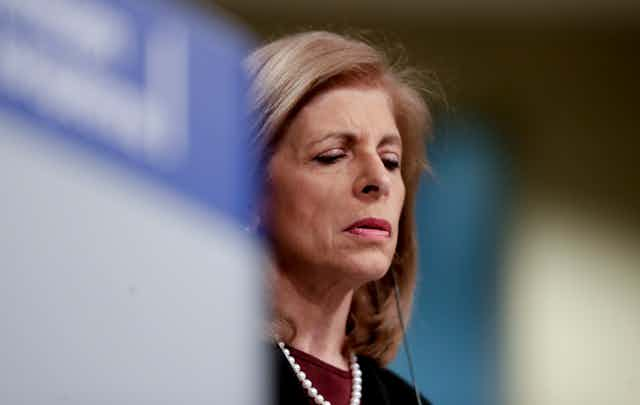Hopes that rolling out vaccines would control the the pandemic have been dealt a blow by an emerging dispute between the EU and AstraZeneca. The manufacturer has said that because of production problems in Belgium, it will not be able to supply as many vaccines as expected to the EU, but that its supply to UK will be unaffected.
In response, the EU has said it should be given a share of AstraZeneca doses manufactured in Britain, and politicians have suggested it could control exports of other vaccines – such as Pfizer’s – out of the bloc. This is despite the European Medicines Agency not yet having authorised the AstraZeneca vaccine, although approval is expected soon. But the EU still faces questions over its slow vaccine rollout.
It was clear from the outset that it would take a very long time to make enough vaccines to meet demand. In this context, the EU, UK, USA and Canada ordered enough doses to vaccinate their populations several times over. These orders were placed as a way of hedging bets, as it wasn’t clear which vaccines would be successful.
But on January 22 2021, AstraZeneca revealed that the order placed by the EU would come up short. In the first quarter of 2021, AstraZeneca said it would deliver 31 million vaccine doses to the bloc, rather than 80 million as stated previously. The EU president and health commissioner immediately pushed back against the decision.
On January 26, AstraZeneca CEO Pascal Soriot gave an interview to the Italian newspaper La Repubblica, explaining the situation in more detail. There are two stages to vaccine production, he said: the production of the drug substance (the vaccine itself) and production of the final product (putting the vaccine in vials for use). These steps are carried out in different locations in different countries.
Mr Soriot said that there have been teething problems with the first step, as the yield of the vaccine-production process is often not high enough. This has been resolved in UK plants, as they started production earlier due to the UK signing its supply agreement with AstraZeneca three months before the EU. But these issues are yet to be resolved at the Belgian plant supplying Europe.

However, AstraZeneca feels that issues with the production of the drug substance will be resolved. From February, it estimates global production will increase to 100 million doses a month, with EU facilities accounting for 17% of this supply. But in the meantime, it is continuing to scale up production in the UK to 2 million doses a week, with Britain’s schedule not expected to be affected by problems elsewhere.
Despite meetings with AstraZeneca to understand the delayed deliveries, EU officials are not satisfied with this. Health Commissioner Stella Kyriakides has said: “We reject the logic of first come, first served. That may work at the neighbourhood butcher’s, but not in contracts and not in our advanced purchase agreements.”
The EU has implied that the shortfall in vaccine availability is due to AstraZeneca selling vaccines to other countries, and that it should make good the shortfall by restricting supply to UK.
But what exactly was agreed?
The EU hasn’t disclosed exactly what its advanced purchase agreement with AstraZeneca is. The agreement secures a number of doses, and individual member states can order these once the vaccine’s use has been authorised. In AstraZeneca’s view, it agreed to supply vaccines according to its “best effort”, rather than committing to delivering a certain number of doses by a certain date. It expects to meet its future quarterly targets for the EU, should the European Medicines Agency authorise the vaccine.
Some, such as Germany’s health minister Jens Spahn, have said that in the meantime the EU should stop exporting other vaccines made on the continent, such as the Pfizer/BioNTech vaccine. For now the EU is only upping requirements as far as making manufacturers declare their exports. But export bans may follow.
It may seem strange that the EU is getting worried about a vaccine that it hasn’t yet approved, especially as there are concerns in Europe about its efficacy. But there are factors at play in the background. The US is not exporting vaccine doses manufactured domestically, as Donald Trump signed an executive order to restrict the use of US-produced vaccines to the US alone. The current push for vaccination under President Joe Biden suggests that the US will not be backtracking on exporting vaccine doses any time soon.
Pfizer has also reduced supply of its vaccine in Europe as it looks to upscale its production capacity. Meanwhile, vaccine development by the Louis Pasteur Institute and Merck in France has been abandoned, while the French medical giant Sanofi is also struggling with its programme. The EU is seeing multiple hedged bets failing.

The EU is lagging behind the US and UK in vaccinating its population. Part of this is due to its slowness in ordering and approving vaccines, but to some extent it’s also down to potential over-reliance on the AstraZeneca vaccine. With civil unrest in Netherlands against lockdown, there’s growing pressure to increase the rate of vaccination in order to lift such restrictions.
There’s also an edge to this controversy because the UK’s delivery of AstraZeneca vaccines is unaffected. In the aftermath of Brexit, it’s easier for the EU to pick on the supply chain that’s working for UK rather than targeting, say, the one that’s working for the US. There are already export bans on medicines from the UK to EU and a trade war may be brewing.
But the question of who should get the vaccine, the UK or the EU, is really a controversy that should be avoided. Vaccine nationalism that one feared would happen is clearly here, and if left unchecked, is going to create new stress points that will hinder the coordinated pandemic response.

